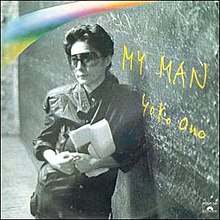
Yoko Ono is a Japanese multimedia artist, singer, songwriter, and peace activist. Her work also encompasses performance art and filmmaking.

"Too Many People" is a song by Paul McCartney from his and his wife Linda McCartney's 1971 album Ram. It was issued as well as the B-side of the "Uncle Albert/Admiral Halsey" single. It was also included on The 7" Singles Box in 2022.

"(Just Like) Starting Over" is a song written and performed by John Lennon from the 1980 album, Double Fantasy. It was released as a single on 24 October 1980 in the United Kingdom, with Yoko Ono's "Kiss Kiss Kiss" as the B-side. It reached number one in both the US and UK after Lennon was murdered on 8 December 1980. It was Lennon's final single released in his lifetime.

It's Alright (I See Rainbows) is the sixth solo album by Yoko Ono, and her second release after the death of husband John Lennon. As a variation of a theme concerning its predecessor, the back cover features a transparent image of Lennon in a then-contemporary photo of Yoko and Sean, depicted in Central Park. This album, released in 1982, marked Ono's first foray into new wave sounds and 1980s pop production. All songs were written, composed, arranged, produced, and sung by Ono. It charted at #98 in the US.

Onobox is a 1992 comprehensive 6-disc collection of Yoko Ono's work from 1968 to 1985. The discs are grouped by era and theme. Disc one centers around the albums Fly and Yoko Ono/Plastic Ono Band, while Disc two features nearly the entirety of Approximately Infinite Universe in a different running order and most of the tracks remixed exclusively for this boxed set. Disc three features the entire Feeling the Space project, which was originally conceived and recorded as a double album before being edited down, while disc six is the previously unreleased 1974 album A Story, which was later reissued separately with an expanded track listing, along with the rest of Ono's back catalogue.

Season of Glass is the fifth studio album by Yoko Ono, her first solo recording after the murder of her husband John Lennon. Season of Glass, released in 1981, reached number 49 on the US Billboard 200 albums chart, making it Ono's highest-charting solo album to date.

Yoko Ono/Plastic Ono Band is the debut studio album by Japanese artist and musician Yoko Ono, released on Apple Records in December 1970. It was released simultaneously with her husband's album John Lennon/Plastic Ono Band. Backed by the Plastic Ono Band and, on one track, the Ornette Coleman Quartet, it followed the release of three experimental albums with Lennon and a live album from the 1969 version of the Plastic Ono Band. In the United States, it peaked at number 182 on the Billboard Top LPs chart.

"Walking on Thin Ice" is a song by Yoko Ono, released in 1981. She and John Lennon concluded the recording of the song on December 8, 1980. It was upon their return from the recording studio to The Dakota that Lennon was murdered by Mark David Chapman. Lennon was clutching a tape of a final mix of the song before it was mastered when he was shot.

Fly is the second album by Yoko Ono, released in 1971. Co-produced by Ono and John Lennon, the original release was a complete avant-garde/Fluxus package in a gatefold sleeve that came with a full-size poster and a postcard to order Ono's 1964 book Grapefruit. Notable songs include the singles "Midsummer New York" and "Mrs. Lennon", "Hirake" and "Don't Worry, Kyoko ", that was dedicated to Ono's daughter Kyoko Cox. "Airmale", that benefits from the automated noise music machines of Fluxus musician Joe Jones, is the soundtrack to Lennon's film Erection, showing a building being erected in time lapsed photography, while "Fly" is the soundtrack to Lennon and Ono's 1970 film Fly. The entire side three of this LP has Ono performing with various automated sound-machines created by Joe Jones pictured in the gatefold.

"No, No, No" is a song by Yoko Ono from her 1981 album Season of Glass. The song is one of the most dramatic tracks on the album to address her husband John Lennon's murder. The song begins with the sound of four gunshots and Ono screaming. The single version was longer than the album version and included a spoken word section of Sean Ono-Lennon recalling a story his father told him which was previously included on the album track "Even When You're Far Away". The B-side was "Will You Touch Me". The 12" version also contained "I Don't Know Why" and "She Gets Down on Her Knees".

"Never Say Goodbye" is the second single from Yoko Ono's 1982 album It's Alright . Like many of Ono's songs from this period, the lyrics deal with her emotional healing following the murder of her husband John Lennon. The upbeat new wave song samples a recording of Lennon screaming Yoko's name from their Wedding Album, followed by her son Sean waking her, as if it were a bad dream. The song garnered minor airplay upon release. "Loneliness" appeared on the B-side. The 1995 New York Rock version was also released as a single.

"Hell in Paradise" is a song by Yoko Ono from the 1985 album Starpeace. The lyrics are about mankind's perceived idea of hell, despite living in the paradise that Ono considers to be planet Earth. After "Walking on Thin Ice", it was her biggest hit of the 1980s, charting at number 16 on the US dance chart. Ono went on hiatus after Starpeace; this would be her last proper single until 2001's remix of "Open Your Box".
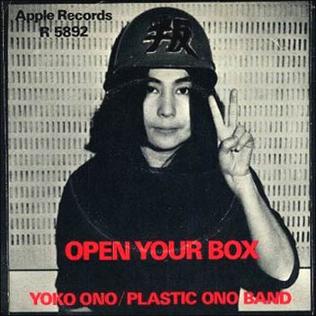
"Open Your Box" is a The Plastic Ono Band song by Yoko Ono, released on 12 March 1971 as the B-side of John Lennon's single "Power to the People". Lennon played guitar and produced the song.
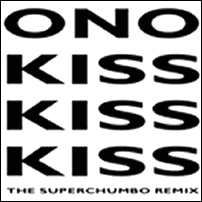
"Kiss Kiss Kiss" is a song by Japanese singer Yoko Ono. It was originally released on Double Fantasy, her joint album with John Lennon, as well as on the B-side of his "(Just Like) Starting Over" single. The disco and new wave-influenced song features Ono gasping heavily and appearing to reach orgasm.
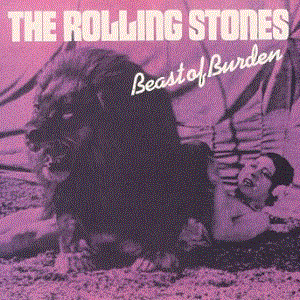
"Beast of Burden" is a song by the English rock band the Rolling Stones, featured on the 1978 album Some Girls. In 2004, Rolling Stone magazine ranked the song No. 435 on their list of "The 500 Greatest Songs of All Time".

"Woman" is a song written and performed by English singer, songwriter, musician and peace activist John Lennon from his 1980 album Double Fantasy. The track was chosen by Lennon to be the second single released from the Double Fantasy album, and it was the first Lennon single issued after his murder on 8 December 1980. The B-side of the single is Ono's song "Beautiful Boys".
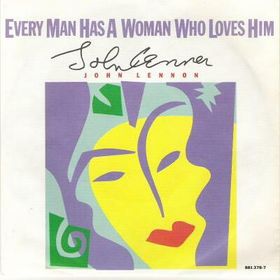
"Every Man Has a Woman Who Loves Him" is a song by Yoko Ono from the album Double Fantasy with John Lennon. Other versions were released, including one released as a single where Ono's voice was removed, leaving what had been Lennon's backing vocal as the primary vocal.

"Green River" is a song by American rock band Creedence Clearwater Revival. It was written by John Fogerty and released as a single in July 1969, one month before the album of the same name was released. "Green River" peaked at number two for one week, behind "Sugar, Sugar" by The Archies, and was ranked by Billboard as the No. 31 song of 1969.
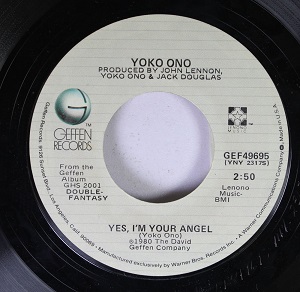
"Yes, I'm Your Angel", also known as "I'm Your Angel", is a song written by Yoko Ono that was first released on Ono's and John Lennon's 1980 album Double Fantasy. It was later released as the b-side of Lennon's single "Watching the Wheels." The initial release of Double Fantasy used the title "I'm Your Angel" but later releases as well as the single used the title "Yes, I'm Your Angel."

"Death of Samantha" is a song written by Yoko Ono and first released on her 1973 album Approximately Infinite Universe. It was also released as a single, backed by "Yang Yang". It has also been covered by a number of artists, including Boy George, Hermine Demoriane and Porcupine Tree.
